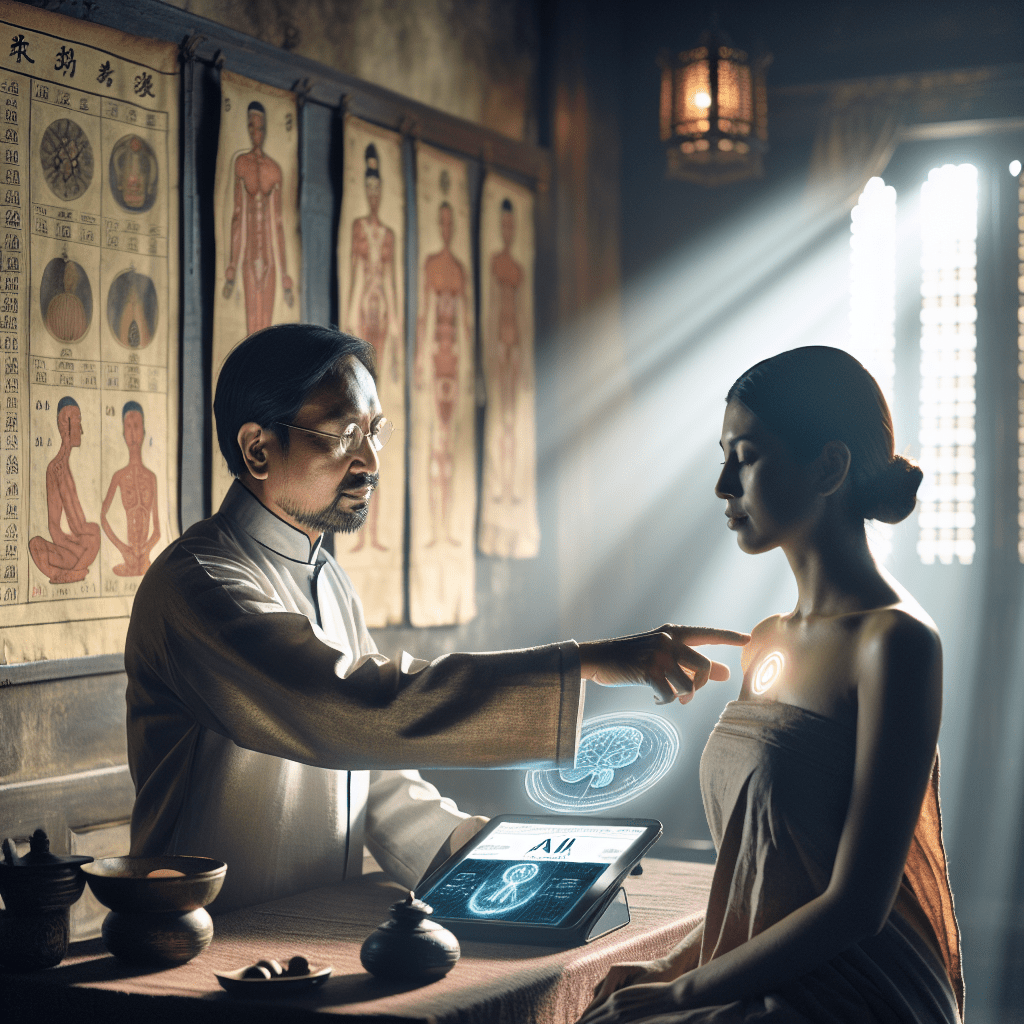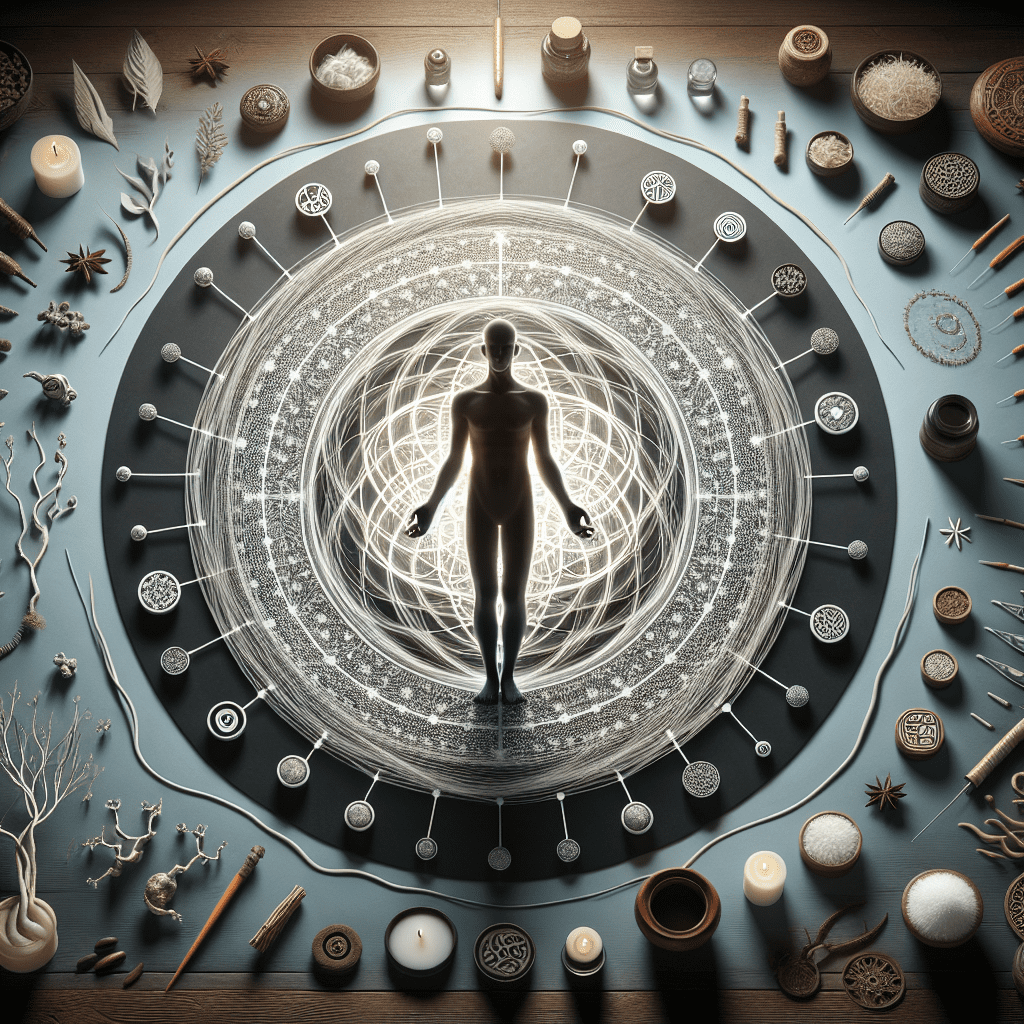Imagine a healthcare approach that doesn’t just treat your symptoms but understands the unique language your body speaks. Eastern Medicine has been decoding this language for thousands of years, and now, with artificial intelligence by its side, this ancient wisdom is becoming more accessible and precise than ever before.
The Whispers of Your Body: Understanding Eastern Medicine’s Approach
Eastern medicine views health as a delicate balance within your body’s ecosystem, where every symptom speaks volumes about your overall wellbeing.
Eastern Medicine isn’t just about treating illness—it’s about listening to the subtle conversations happening within your body. Unlike Western medicine’s focus on isolated symptoms, Eastern practices like Traditional Chinese Medicine (TCM) view your body as an interconnected ecosystem where balance is key to health.
For centuries, skilled practitioners have relied on methods like pulse reading and tongue analysis to understand your constitutional patterns. When a TCM doctor holds your wrist, they’re not just counting beats—they’re feeling the quality, rhythm, and strength of your pulse across different positions, each corresponding to different organ systems. Similarly, the color, coating, and shape of your tongue tell a story about your internal health that might surprise you.
These diagnostic methods might seem mysterious to newcomers, but they’re grounded in observations refined over thousands of years. They help identify imbalances in your body’s Qi (vital energy), the harmony between Yin and Yang forces, and the functioning of your organ systems—often before these imbalances manifest as obvious symptoms.
“Eastern Medicine sees symptoms as the body’s way of communicating deeper imbalances,” explains a senior practitioner at HerbalsZen. “We’re essentially translators of the body’s ancient language.”
AI: The New Translator of Ancient Wisdom
Enter artificial intelligence—the technological marvel that’s revolutionizing how we access and apply Eastern Medicine’s wisdom. Eastern Medicine AI systems are now capable of processing vast amounts of patient data, recognizing patterns that might take human practitioners decades to master.
Imagine an AI system analyzing thousands of tongue images, correlating specific patterns with health outcomes, and learning from each case it encounters. This is no longer science fiction—it’s happening right now. Researchers are using deep learning algorithms to analyze tongue diagnoses with remarkable accuracy, creating diagnostic tools that can support both novice and experienced practitioners.
Pulse diagnosis, traditionally requiring years of training to master, is also being enhanced through AI. Sensors can now detect subtle variations in pulse qualities, while algorithms analyze these readings against databases of known patterns, providing insights that complement a practitioner’s expertise.
The integration of Eastern Medicine AI doesn’t replace the human touch—it amplifies it. By handling data processing and pattern recognition, AI frees practitioners to focus on what humans do best: building relationships, providing compassionate care, and making nuanced decisions that consider the whole person.
Constitutional Patterns: Your Body’s Blueprint
Your constitutional pattern is as unique as your fingerprint, influencing how you experience health and respond to treatments.
One of Eastern Medicine’s most profound insights is that we each have unique constitutional patterns—essentially, your body’s default settings and tendencies. These patterns influence everything from how you digest food to how you respond to stress and weather changes.
In TCM, constitutional types might be categorized according to the Five Elements (Wood, Fire, Earth, Metal, and Water) or patterns of Yin-Yang balance—a perspective that even suggests connections between your physical constitution and personality traits. Understanding your constitution is like having access to your body’s operating manual—it reveals your inherent strengths, vulnerabilities, and optimal paths to wellness.
AI is revolutionizing how these constitutional patterns are identified and applied. By analyzing combinations of symptoms, health history, lifestyle factors, and physical characteristics, Eastern Medicine AI can recognize subtle constitutional patterns with increasing precision.
“What’s exciting about Eastern Medicine AI is its ability to see connections across seemingly unrelated symptoms,” notes a developer working with HerbalsZen’s EASTCHI AI system. “For example, the system might recognize that your digestive issues, mild anxiety, and seasonal allergies all point to a specific constitutional imbalance that can be addressed holistically.”
This technology is especially valuable because constitutional patterns aren’t static—they evolve with age, environment, and life circumstances. AI systems can track these changes over time, providing insights into how your body’s needs are shifting and how your wellness approach should adapt accordingly.
Personalized Medicine: Beyond One-Size-Fits-All Solutions
The marriage of Eastern Medicine and AI is ushering in a new era of truly personalized healthcare. While Western medicine is just beginning to embrace personalization through genomics, Eastern Medicine has always been inherently personalized, recognizing that each individual requires a unique approach.
Eastern Medicine AI enhances this personalization by processing more variables than a human practitioner could reasonably track. Your diet, sleep patterns, stress levels, emotional state, environmental exposures, and subtle symptoms all become data points that inform your individualized wellness plan.
This approach addresses root causes rather than just symptoms. If you’re experiencing headaches, for instance, an Eastern Medicine AI might identify patterns suggesting they stem from liver Qi stagnation rather than just recommending a pain reliever. Your treatment plan might then include specific herbs, dietary adjustments, acupressure points, and lifestyle changes tailored to your constitutional type and current conditions.
At HerbalsZen, the EASTCHI AI exemplifies this philosophy by creating customized nutrition plans and lifestyle recommendations based on Eastern medical theories. The system considers your constitutional type according to Five Element Theory, seasonal influences, and the Eastern concept of food as medicine to create recommendations uniquely suited to your body’s needs.
“We’re not interested in generic health advice,” states HerbalsZen’s philosophy. “Every body speaks its own dialect of health and wellness. Our technology helps translate that dialect into practical, personalized guidance.”
Data-Driven Herbal Wisdom: Refining Ancient Formulas
Eastern herbal medicine combines plants in precise formulations that work synergistically—a complexity that AI is now helping to optimize.
For thousands of years, Eastern Medicine practitioners have crafted herbal formulas with remarkable sophistication, combining multiple herbs to address complex patterns of imbalance. These traditional formulas are often based on complex theories about how herbs interact with each other and with different body constitutions.
Eastern Medicine AI is now enhancing this herbal wisdom by analyzing outcomes across thousands of cases, identifying which combinations and dosages work best for specific constitutional types and conditions. This data-driven approach doesn’t replace traditional knowledge—it refines it, helping practitioners make more precise decisions.
AI can also help identify potential herb-drug interactions, an increasingly important consideration as more people combine Eastern and Western approaches. By analyzing research data and patient experiences, these systems can flag potential safety concerns while suggesting compatible alternatives.
The result is a more personalized approach to herbal therapy. Rather than prescribing standard formulas, practitioners supported by AI can fine-tune combinations and dosages to match your exact needs. This precision reduces the likelihood of side effects while maximizing therapeutic benefits—a win-win that honors Eastern Medicine’s commitment to “first, do no harm.”
“Our goal is to honor the sophistication of traditional herbal wisdom while enhancing its precision through modern technology,” explains a researcher developing algorithms for EASTCHI AI. “The combination gives us the best of both worlds—time-tested knowledge with data-driven refinement.”
Navigating Challenges: The Human-AI Balance
Despite its promise, integrating AI with Eastern Medicine presents challenges that require thoughtful navigation. One major concern is ensuring prediction accuracy. Eastern Medicine diagnoses often rely on subtle observations that may be difficult to quantify or program into algorithms. How do you teach a computer to recognize the difference between a “wiry” and a “slippery” pulse quality?
There’s also the essential question of preserving the human element in healing. Eastern Medicine has always emphasized the relationship between practitioner and patient, recognizing that healing happens within a context of trust and understanding. AI must enhance rather than replace this human connection.
Researchers are addressing these challenges through innovative approaches. Some are developing sensors that can detect subtle diagnostic signs like pulse qualities or tongue features. Others are creating hybrid systems where AI makes recommendations but human practitioners make final decisions, bringing their intuition and experience to bear.
“The goal isn’t to automate Eastern Medicine but to augment it,” emphasizes a developer working on diagnostic algorithms. “We want AI to handle the data-heavy lifting so human practitioners can focus on what they do best—providing compassionate, intuitive care.”
Ongoing research is exploring how AI and human practitioners can collaborate most effectively, creating workflows that leverage the strengths of each. This research suggests that the most powerful approach is neither AI alone nor humans alone, but a thoughtful integration that respects the value of both.
The Future: Ancient Wisdom, Modern Precision
The future of healthcare lies in the harmonious integration of ancient wisdom and modern technology, creating a truly personalized approach to wellness.
As we look to the future, the integration of Eastern Medicine and AI promises a healthcare approach that honors traditional wisdom while embracing technological innovation. This isn’t about replacing ancient practices with algorithms—it’s about using technology to make these practices more accessible, precise, and adaptable to modern life.
Imagine a future where your smartphone can analyze your tongue each morning, track subtle changes in your pulse throughout the day, and use this information to offer daily wellness recommendations tailored to your constitutional type. Or where practitioners have AI assistants that help them craft precisely targeted treatment plans based on your unique pattern of imbalances.
This future is already emerging. HerbalsZen’s EASTCHI AI represents an early step in this journey, fusing 2,000 years of Eastern medical knowledge with cutting-edge artificial intelligence. As this technology evolves, it will become increasingly sophisticated at understanding the unique language your body speaks and translating it into practical wellness guidance.
The ultimate promise of Eastern Medicine AI is healthcare that truly sees you as an individual—not just a collection of symptoms, but a complex, unique being with your own constitutional patterns and needs. By decoding your body’s secret language through the combined lens of ancient wisdom and modern technology, this approach offers a path to wellness that is as unique as you are.
In a world of increasing health challenges and one-size-fits-all solutions, this personalized, holistic approach couldn’t be more timely. As Eastern Medicine AI continues to evolve, it stands poised to transform not just how we treat illness, but how we understand and nurture the remarkable intelligence of our own bodies.




